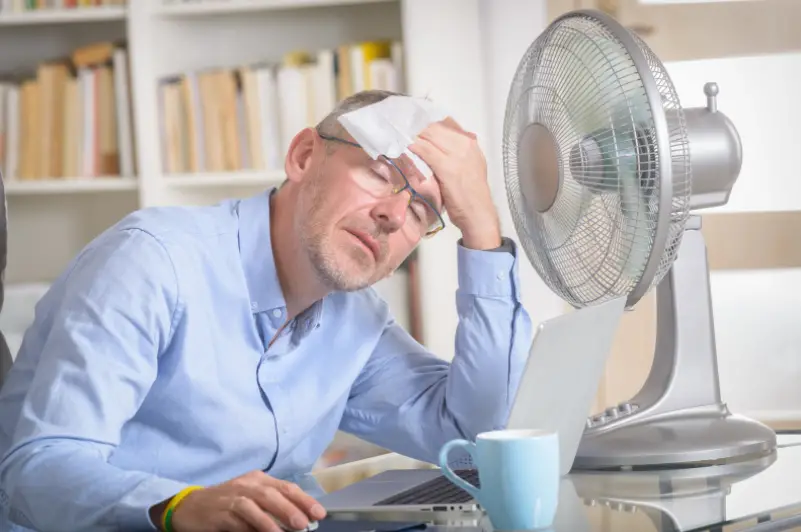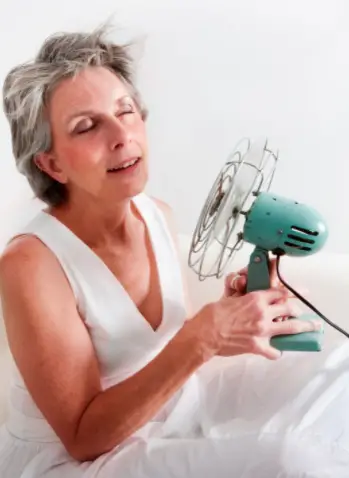
During the summer, do air purifiers cool the room? Generally speaking, air purifiers are only meant to be cleaning devices for the home. If you’ll need a cooling device then you should still at least have an electric fan and/or an air conditioner. However, that doesn’t necessarily mean air purifiers won’t benefit you in warm weather!
Since an air purifier cleans your breathing space from pollutants, it will help you breathe easier in the summer when the air is too stuffy. After all, air purifiers nowadays have a motor and a fan that helps in cleaning the air thoroughly.
With that said, proper ventilation is still important for your room to make the air purifier more effective. In this article, we’d like to help you out by clearing out the facts about an air purifier for use in the summer season. Moreover, if you’d like to know more about their differences. Check out our air purifier vs. air conditioner article.

Is the air purifier the same as the fan?
While an air purifier may look similar to an electric fan (made for cooling) because of its design and selection of fan speeds, an air purifier is different from that. The main purpose of an air purifier is to clean the air from pollutants such as:
- dust
- smoke particles
- mold
- pet dander
- pollen
- dust mites
- VOCs
With that said, if you want a combination of an air puffier and a fan, there are models out there that combine both. Such air purifiers will help you enjoy the benefits of a cooling fan while also purifying the air – most of them even have space heater functions and dehumidifiers to help you relax at home at any time of the year.

Do air purifiers make the room hot?
Air purifiers don’t exactly make the room hot – unless your air purifier has a heater option. For instance, if you check out our BlueAir vs Dyson comparison article, you’ll spot some Dyson air purifiers that have this feature, which is suitable for all-year use (it also has a cooling fan).
If you lack space at home for a separate heater, you’ll want these kinds of air purifiers as they don’t take a lot of footprint in the home (or office) plus they will do multiple jobs in one go.
Does the air purifier circulate air?
Yes, air purifiers will circulate air based on their specs, such as CFM (cubic feet per minute). A higher CFM of an air purifier means they will circulate air faster and better than most units out there.
If you want an air purifier that cleans the air sufficiently for your room, you have to consider the following (other than the CFM):
1. Room size
When buying an air purifier, always look for the rated room size. For instance, the best air purifiers for small rooms will be around 100 to 300 square feet in size and you don’t necessarily have to look for a high CFM in them – a CFM of 100 to 200 will do if you want a small room unit.
2. Number of fan speeds
Usually, an air purifier will have 1 to 3 fan speeds to choose from – controlled either manually or automatically through an AQI/sensor (mentioned below). Whichever is the case, some air purifiers also have a special turbo mode, which is useful for allergy season or when the air is extra stuffy.
Take note that a higher fan speed means that your air purifier will consume more electricity – but still, not much of a concern compared to other appliances in your home. That’s because the average air purifier electric consumption is around 50 watts, which is akin to a laptop computer or an electric blanket.
3. Air quality index
The AQI or air quality index is the unit of measurement for the cleanliness of a given room, space, or area. If you don’t know your AQI, you can check the locality if your air quality is good or bad. If you bought an air purifier with a sensor, it will also give you the details and help you assess how much you need to use the air purifier.
Oftentimes, sensor-capable air purifiers already have the function of cleaning the air based on the air quality levels, so you don’t have to do much. Based on the detected air quality, they will switch the fan speeds accordingly.
With that said, it’s still important to know about your air quality so you’ll know when it’s time for an all-nighter with your air purifier to thoroughly and continuously clean the air.

Should I run a ceiling fan with an air purifier?
It depends on the situation. However, generally, it is safe to run a ceiling fan with an air purifier, provided that you do the following:
1. Don’t over-ventilate
When we say don’t over-ventilate, we mean don’t open your windows all the time. That’s because the ceiling fan will only blow polluted air into your air purifier, causing it to suffer too much in cleaning the air.
Instead, open the windows, doors, and ventilation shafts sparingly so as not to cause too much pollution to enter your home.
2. Don’t make the ceiling fan too harsh
To play it safe, put your ceiling fan and your air purifier at a similar speed. In this way, your air purifier won’t be “overwhelmed” when it comes to cleaning the air. Fan speeds that are too fast for the air purifier to handle will mean less efficiency in cleaning so it’s best to leave them at a similar speed.
Conclusion
To wrap it up, air purifiers may not directly cool the room, but they can help in cleaning the air when combined properly with a fan or an air conditioner to get rid of the stuffy feeling.
It has a fan in its system so it moves air, but you’ll still need a fan or an AC unit to do the rest of the cooling. With that said, we hope this article helped you to get ideas on how to stay cool in the summer!


